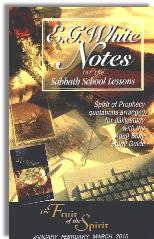|
||||||||||||||
Commentary on "The Fruit of the Spirit is Joy"
Day 2: Sunday, January 10, 2010
Overview
This lesson explores the meaning of the command to “rejoice in the Lord always.” Many Christians experience highs and lows because they become victims of their circumstances and do not rise above them. We can’t always rejoice in circumstances or people, because these things might be negative. However, we can rejoice in the Lord, the author says, because He is always good and never changes. The lesson concludes that our spiritual stability is a result of our knowledge of and commitment to God.
Observations
Let’s examine the assumption that we can’t rejoice in negative circumstances or people. Here are some texts about the Christian response to trouble.
“Blessed are you when people insult you, persecute you because of Me…Rejoice and be glad.” Matthew 5:11, 12
“Count it all joy, my brothers, when you meet trials of various kinds, for you know that the testing of your faith produces steadfastness.” James 1:2
“Not only so, but we also rejoice in our sufferings, because we know that suffering produces perseverance…” Romans 5:3
From these scriptures, we can see that “negative” people and circumstances are indeed something to praise God for, since they are things that He brings into our lives to bring about our good.
“And we know that for those who love God all things work together for good, for those who are called according to his purpose.” Romans 8:28
God isn’t just the Author of the nice things in our lives, but the Master of our storms. In Psalms 139, we find a picture of God that is disturbing and intrusive. David proclaims God’s total sovereignty over all His creation, over every detail of our lives, and over every moment of our histories. Before our births, God wasn’t just a detached observer of our developing fetuses. He was present and active, forming our inward parts, knitting us together in our mothers’ wombs.
“In your book were written, every one of them, the days that were formed for me, when as yet there was none of them.”
No part of our personal stories lies outside of His Lordship. God hems David in, both behind and before, yet he rejoices! “Wonderful are your works; my soul knows it very well.” This psalm’s view of God is so deep and comprehensive; it should first evoke awe and worship in us, just as it does for David.
When confronted with these ideas of God’s total sovereignty, many Christians won’t rejoice, but will dismiss such interference over their lives as too deterministic. We can believe He formed mountains and stars, but having “the days that were formed for me” already written down is getting too meddlesome!
So what about our rights to direct our own lives? David knew he didn’t direct his own life, it is clear from this psalm, and was glad of it. We often wonder why so many Christians have trouble trusting God (and each other), while we remain obsessed with our sovereign freedom to do things our way. Where is that proud banner of “free will” that so many Adventists are waving? You won’t find it in Psalm 139, for there is no room for self-reliance there. What you will find is the deepest, most satisfying Source for your joy.
Summary
- We can rejoice in hard circumstances and nasty people because God has a purpose for them, and they are given to us for our ultimate good.
- Psalms 139 portrays the kind of God we can trust with our storms. From Him there is no escape; He is Lord of the cosmos and our personal histories as well.
- When confronted with God’s sovereignty, we can attempt to flee from Him, or worship Him.
- God’s sovereignty interferes with our ideas of free will, humbles our pride, and gives us reason to rejoice.
GO TO DAY 3
Copyright 2010 BibleStudiesForAdventists.com. All rights reserved. Revised January 7, 2010. This website is published by Life Assurance Ministries, Glendale, Arizona, USA, the publisher of Proclamation! Magazine. Contact email: BibleStudiesForAdventists@gmail.com.
The Sabbath School Bible Study Guide and the corresponding E.G. White Notes are published by Pacific Press Publishing Association, which is owned and operated by the Seventh-day Adventist church. The current quarter's editions are pictured above.
Official Adventist Resources
Standard Edition Study Guide Week 3
Teacher's Edition Study Guide Week 3
Easy Reading Edition Study Guide Week 3
Search the Complete Published Ellen G. White Writings


